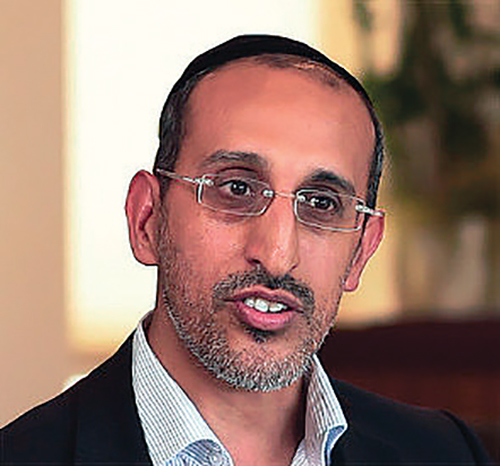
Englewood—A recent event for educators in Englewood was held with the CEO and the CTO of Mercava, two Israel-based serial technology entrepreneurs who seek to digitize and “interactivize” nothing less than the canon of Jewish education. According to the organization’s promotional video, which has since January garnered almost 25,000 views on YouTube, these kinds of disruptive technology innovations are required because of the changing nature of our very connected, gadget-happy students, who have become accustomed to information coming at them very rapidly, and the cost of not digitizing could be as dire as losing the entire generation.
Supported by technology, animation, and education executives from household names such as Facebook, Disney, and Pearson Education, Mercava seeks to build interactive tools, quizzes, illustrations, and explanations directly into the pages of digital textbooks visible from any computer, tablet, or mobile device. The organization has reportedly gathered 500 tech-savvy volunteers from the business, technology, and entertainment communities to help add value and make the vision a reality. It’s a multi-million dollar project that is, as yet, only partially funded.
“Every single person around the world is going to have access to thousands of interactive books, apps, lessons, films, animations; an entire gamut of creative content that will make Jewish education irresistible,” said Yehuda Moshe, CEO and founder of Mercava. Mercava’s aim is to function like Apple’s App Store, Moshe said, having many offerings available free of charge. But as they are also working with all the major Jewish book publishers and are partnering with them, Moshe said not all items in the Mercava product lines are likely to be free.
At the Englewood event, Moshe, along with Mercava co-founder and CTO Ariel Isaacson, presented elements of Mercava’s plans to educators and explained the potential for working Mercava’s interactive technology into their lesson plans. “We are here to help the educators. We want you to be able to do what you do best,” Moshe said.
“We want this to be a joy to use, an experience that everyone will remember; an experience that will make you come back for more and more and more,” said Isaacson.
Moshe and Isaacson both stressed that the educators will be fully in control of the tools and that they are actively seeking content feedback, comments, and criticism from educators in order to improve the value of their offerings.
According to Lisa Farkovitz, who was one of the hosts of the Englewood event, Mercava, because of widespread demand, has focused initially on the development of interactive versions of the books most often used by Jewish educators. Fully interactive versions of the Torah, Nevi’im, Ketuvim, Talmud Bavli, Rambam, Shulchan Aruch, Aruch HaShulchan, and Mesilat Yesharim have been used by thousands of students across North America, the United Kingdom, and Australia. Mercava’s goal is to provide Jewish educators “with the technology platform, media resources, and talent they require to produce unparalleled digital learning experiences,” she said.
Rabbi Tzvi Pittinsky, Director of Education Technology at the Frisch School, was present at the event and spoke briefly about how he helped integrate Mercava technology into a curriculum for a group of 10th graders this past year. “One 10th grade teacher used Mercava to help students who were emerging Gemara learners who did not yet possess strong reading skills. The teacher chose Mercava because he liked the way that it divided and translated the Gemara into small segments and phrases. This enabled the students with weak textual skills to bypass the initial stage of translating the words and move straight into analyzing the discussions and arguments in the text. This was very powerful for students who would not otherwise be able to learn Gemara on their own,” Pittinsky explained.
Pittinsky explained that because Mercava works off of an actual Tzurat Hadaf, the classic Gemara page layout, and translates phrase by phrase, students actually look inside the Hebrew/Aramaic text when accessing the English translations and can make connections to learn the vocabulary. “The translation is simple enough for any student, while at the same time providing explanations for concepts as well. It is a very effective teaching tool for students who need these supports,” he said.
In its present form, Mercava is excellent for students who are emerging learners, but Pittinsky said that he is very excited for the new features that are upcoming this year, which should make it a transformative tool for many Gemara classrooms. “The ability to record the teacher reading the Gemara in the app, create vocabulary quizzes from the app, turn off different translations based on the level of class, color code the Gemara, cross reference different sources, create cartoons acting out the Gemara, embed videos and pictures, etc., are all very exciting tools. These are features that can really be transformative in the Judaic Studies classroom,” he said.
Daniel Shor, a Bergenfield resident who is Director of Technology at Westchester Day School in Mamaroneck, said that the beauty of a solution like Mercava is that it does not require any specific technology to be of use. “A school would not need to invest into a specific technology like iPads, Chromebooks, Macs, or PCs in order to make use of Mercava. Likewise, a student would not need a specific device in order to use Mercava at home, important for any school looking to use Mercava to ‘flip the classroom,’” he said.
By Elizabeth Kratz









